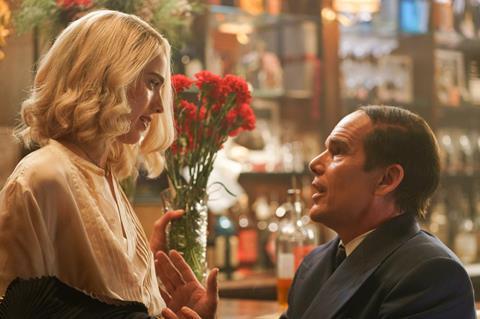Andrew Scott, Margaret Qualley co-star in a poignant portrait of Broadway lyricist Lorenz Hart

Dir: Richard Linklater. USA/Ireland. 2025. 100mins
Before Rodgers and Hammerstein, there was Rodgers and Hart. It was composer Richard Rodgers’ creative partnership with lyricist Lorenz Hart in the 1920s and 1930s that arguably dragged Broadway musical theatre out of the shadow of operatic melodrama and into the modern age, putting ordinary, relatable American speech into the mouths of singers for the first time. But Hart was an increasingly unreliable working partner who basically drank himself to his premature death in November 1943, at the age of 48 – and it was Rodgers’ new writing sidekick, Oscar Hammerstein II, who would lead the composer, and himself, to worldwide fame.
Soaked in nostalgia for a lost theatrical world
Blue Moon, which plays out on the night of the premiere of Rogers and Hammerstein’s first hit, Oklahoma!, is a romantic, funny, moving, life-affirming chamber piece that is itself a great example of a three-way creative collaboration – between director Richard Linklater, writer Robert Kaplow and actor Ethan Hawke. Premiering in Berlin Competition, this Sony Pictures Classics acquisition is one of two Linklater projects due to emerge this year – the other being Nouvelle Vague, his drama about the making of Godard’s Breathless. Hawke’s delightful performance here, which combines both twinkle and tragedy, is complimented by support by Andrew Scott (as Rogers) and Margaret Qualley.
The story plays out almost in real time on that May 1943 evening. Unimpressed by the show, Lorenz Hart (Hawke) has drifted across the street before the end to legendary Broadway restaurant and drinking hole Sardi’s (reconstructed with loving fidelity on an Irish soundstage) where the first night party will take place.
Here he regales seasoned barman Eddie (Bobby Cannavale) – a regular, no-nonsense guy who has seen it all – and an army serviceman on leave (John Moran), who is trying out some melodies new and old on the piano, with what is basically a monologue, punctuated by the briefest of interactions with Eddie and the soldier. Along the way, Hart tears into what he sees as the phoney corn-belt patritotism of Oklahoma! – beginning with that unnecessary exclamation mark – while preparing the room for the arrival of his latest crush, Elizabeth (Margaret Qualley), a glamorous Yale student more than 20 years his junior.
Hart was gay, of course. But his obsession with the willowy, smart young Elizabeth is based, an after-title informs us, on letters Hart exchanged with the real Elizabeth Weiland. In the film, the smitten Hart explains the paradox by telling her that he is “drawn to beauty, wherever I find it”.
Anyone with half an eye for drama can see the potential in watching Hart’s creative comet achieve a dying flare-up just when Hammerstein’s new star is born. To do it all in a single location, and to hinge it all on a single performance, with no recourse to flashbacks, is the real challenge. Kaplow’s nuanced script, ably interpreted by Hawke, is as nimble as one of Hart’s own lyrics in shading from self-aggrandizement to self-mockery and self-pity in an instant, while preserving all the lyricist’s well-documented wit and brilliance.
But it’s when the show across the road finally finishes and Rodgers (Andrew Scott) and Hammerstein (Simon Delaney) enter with their doting entourage that Blue Moon shakes off its air of a good off-Broadway play and becomes mesmerisingly cinematic. Scott’s Rodgers seems suave and distracted at first but, in a series of snatched conversations with his old theatrical sparring partner – one tellingly set halfway up a staircase – 20 years of admiration and hurt, professional love and betrayal are laid bare.
In the bland 1948 MGM Rodgers and Hart biopic Words And Music, in which Mickey Rooney played the wayward lyricist, Tom Drake’s Richard Rodgers turns to the camera to apologise for the lack of drama in the story that will follow. “There were none of the trials and tribulations you would ordinarily expect,” he drawls. “In fact we were just two lucky fellows who had success very young”. It has taken until now for the poignancy of this story to be committed to the screen.
With its dark wooden bar, red leather banquettes and framed caricatures of Broadway greats, Sardi’s becomes a kind of safe, performative cocoon for Hart, a small, unassuming guy with a combover whose confidence and stature derive from his way with words and the shots of whisky he shouldn’t be drinking. Intimacy with Elizabeth is achieved only when both retire to the cloakroom – another evocatively used in-between space – where the man famous for his ability to put words to heartbreak succumbs to his own.
An intimate character study, Blue Moon is warmly shot, soaked in nostalgia for a lost theatrical world. It’s accompanied by a medley of melodies – ostensibly played by the pianist soldier Hart names Knuckles – that serves as soundtrack, career-best antholology and, occasionally, ironic counterpoint. Because this is also a film about an artistic perfectionist, intolerant of the kind of easy, populist success he sees in Oklahoma!, He complains that ‘Blue moon, you left me standing alone, without a dream in my heart, without a love of my own’ is one of the corniest lyrics he ever wrote. Yet it’s the one by which he is best remembered.
Production companies: Detour Filmproduction, Renovo Media Group
International distribution: Sony Pictures Classics, sony_classics@spe.sony.com
Producers: Mike Blizzard, John Sloss, Richard Linklater
Screenplay: Robert Kaplow
Cinematography: Shane F. Kelly
Production design: Susie Cullen
Editing: Sandra Adair
Music: Graham Reynolds
Main cast: Ethan Hawke, Margaret Qualley, Bobby Cannavale, Andrew Scott, Simon Delaney























